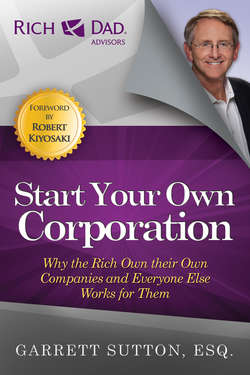Читать книгу Start Your Own Corporation - Garrett Sutton - Страница 8
На сайте Литреса книга снята с продажи.
Chapter One Your Entity Menu
ОглавлениеWelcome to the world of asset protection and entity formation. As you gain knowledge of the strategies and advantages (and you will, in this book) you will come to appreciate your six main menu choices:
• C corporation
• S corporation
• Limited Liability Company (LLC)
• Limited Partnership (LP)
• General Partnership
• Sole Proprietorship
As legal business systems and traditions have developed over the last five hundred years, several structures for running a business have evolved. Each structure or entity, has its own benefits and drawbacks, which we will explore.
First off: What does the word ‘entity’ mean? It refers to an organization (be it a business or governmental unit) which has a legal identity separate from its members. It is derived from the Latin word ‘ens,’ meaning an existing or real thing. So an entity is a real thing, distinguishable and apart from its owners. (Two of the six choices aren’t really real things, which, as you will learn, is not a good thing.)
As a frame of reference for making your entity selection, it is important for you to clarify your strategy in this planning. The purpose of this chapter is for you to clearly understand and choose the best entity for your unique and specific purpose. To that end, the following checklist should be considered:
1. Protection of family assets and investments
2. Management control
3. Avoiding family disputes
4. Flexibility of decision making
5. Succession of children and other family members to management
6. The nature of the business to be operated
7. The nature of the asset to be held
8. The number of owners involved
9. Estate planning and gifting of assets
10. Who may legally obligate the business
11. Effect upon an owner’s death or departure
12. The need for start-up funding and raising of capital
13. Taxation
14. Privacy of ownership
15. Consolidation of assets and investments
These and other issues will become apparent as we review your choices. And please note, your decision does not have to be made alone. It is recommended that these issues be discussed with your attorney, accountant, or other professional advisor. An individual well versed in these areas will provide excellent insight into which entity is right for you.
By reading this book you will be better able to work with your professional advisors. They won’t have to spend time explaining all of the tax issues and limitations of liability strategies to you. By reading this book you will have a leg up. When you meet with your advisors you won’t be stepping up to the plate for the first time. Instead, you’ll be at second base, ready to score. (Fear not, our first sports analogy is also our last one.)
It is important to know that in entity selection one size does not fit all. If your attorney or accountant suggests only one entity, a general partnership for example, for each and every business venture you have him or her review, you will want to question why they believe one entity fits all situations. Or you may want to seek out a new professional advisor.
We will discuss which entities work well in various business and asset holding scenarios. But before doing so, we must point out which entities do not work well in any situation. For as important as knowing which entity to use for running your business, protecting your assets, and limiting your liability is knowing which entity NOT to use.
• Sole proprietorships
• General partnerships
In my legal practice I represent various businesses, from small and basic to large and complicated. I enjoy helping entrepreneurs and business owners make money, provide for their families and employees, and secure a stable future.
I cannot do my job if a client insists on using a bad entity. Sole proprietorships and general partnerships provide no asset protection. Remember the Latin word ‘ens’? It means an existing or real thing. These bad entities are not separate legal ‘things.’ You haven’t registered them with your state. Instead, they are just you, doing business without any protection. One lawsuit against your business, and your house, savings, and personal assets can all be lost. Our first case is illustrative.
